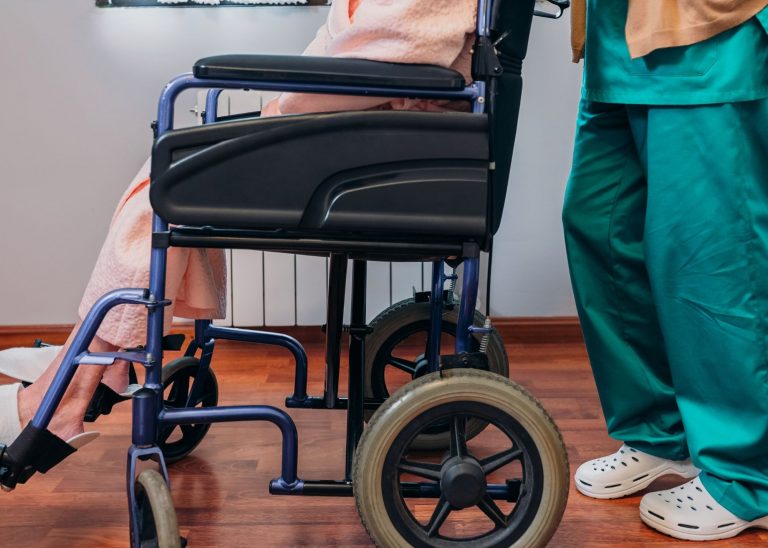When a loved one transitions into hospice care, they do not simply leave the hospital, move home, and hope for the best. Instead, the transition into hospice care begins with a comprehensive hospice evaluation. This evaluation helps your loved one and your family better understand the services offered during hospice care, and helps the hospice care team learn more about your loved one’s needs. This information helps them create a customized care plan to address their specific needs and care goals. After this important meeting concludes, your loved one will be ready to officially enter hospice care and receive the services of their own hospice care team.
What to Expect from Hospice Care
The purpose of hospice care is to provide physical, emotional, and spiritual comfort for someone whose illness is no longer curable. It is typically provided in the patient’s own home so that they can be surrounded by family and all of the usual comforts of home. For caretakers, hospice care provides valuable resources and information to ensure that their loved one is receiving the best support possible. Families are often eligible to receive their own counseling and mental health services from the hospice care provider to help them cope with this difficult phase of life.
Generally speaking, hospice care contains similar elements no matter who is providing it. The hospice care team will schedule visits with your loved one as needed to assist them with activities of daily living (ADLs), such as bathing and dressing, or to complete in-home checkups. The team will likely include a mental health and/or spiritual counselor, who can provide your loved one and other family members with much needed emotional support.
The care team will also arrange for the delivery of any medical equipment and medication necessary and teach family members how to operate that equipment in order to care for your loved one when the hospice team is not visiting. You can call on your hospice care team to ask them questions about your loved one’s care or diagnoses, and they may be able to arrange for transportation to appointments if necessary.
Preparing for a Hospice Evaluation
During the initial evaluation, a hospice representative will help determine whether your loved one qualifies for hospice and begin gathering information to understand their needs. This meeting is also your chance to learn about the provider—how they work, what services they offer, and what support your family can expect. Hospice evaluations are free, with no obligation to enroll.
You’ll first be asked to share basic information such as your loved one’s name, address, and medical power of attorney, along with Medicare information or a Social Security number if applicable. You’ll also share where your loved one is currently living and schedule an in-person meeting to continue the evaluation.
At that appointment, the hospice representative will review your loved one’s diagnosis, symptoms, medications, and medical history. This helps determine whether they meet Medicare’s eligibility guidelines, which require two physicians to certify that a person is terminally ill with a life expectancy of six months or less. If hospice is appropriate, your family can begin discussing a care plan tailored to your loved one’s comfort and goals. Should you decide to move forward, you’ll complete the enrollment paperwork together. Hospice care can be discontinued at any time if your loved one’s condition improves or if you decide to change providers.
Next Steps: What Happens After You Schedule an Evaluation
Once you request an evaluation, here’s what you can expect:
-
A care coordinator will call you to gather basic information.
-
You’ll choose a day and time for an in-home or bedside visit.
-
The hospice representative will meet with you and your loved one to talk through symptoms, concerns, and wishes.
-
You’ll receive an overview of services, support available to your family, and what the first days of hospice look like.
-
If you decide to move forward, the team will guide you through the enrollment process and begin arranging care right away.
Families often share that the evaluation brings clarity, relief, and a sense of partnership—long before the first official day of hospice care.
Read More: 9 Important Truths About Hospice Care
Choosing a Hospice Care Provider
Speak to Superior Senior Home Health for more information about the hospice evaluation process and how hospice care can benefit your family. Our hospice care teams consist of certified nursing assistants, dietitians, licensed practical nurses, registered nurses, therapists, social workers, chaplains, and volunteers, all of whom are trained to provide high quality support for people nearing the end of their lives. Your loved one’s team will create a plan to address their unique needs, and your family will receive comprehensive counseling services and other support as well.
Schedule a Hospice Evaluation
We’re honored to serve families in Santa Maria, Lompoc, San Luis Obispo, and the surrounding areas in Santa Barbara and San Luis Obispo counties. To schedule a hospice evaluation or speak with one of our care coordinators, simply fill out the form below or call us at 805-742-4514.
Superior Home Health & Hospice provides compassionate, hospice, home health, and speech therapy in San Luis Obispo and the surrounding areas. Reach out to us to request a complimentary consultation with an advisor to help you determine your loved one’s home health & hospice needs. To schedule your free consultation, call 805-742-4514 or contact us online.

